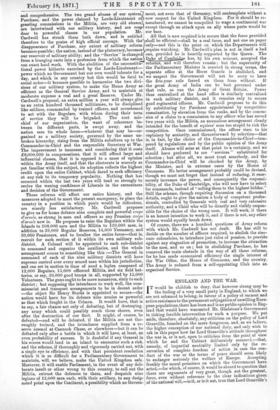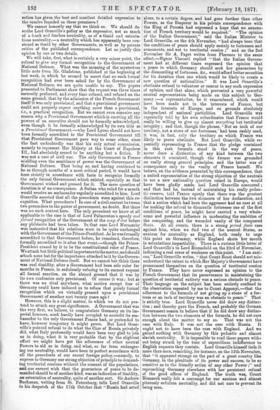ENGLAND AND THE WAR.
IT would be childish to deny, that however strong may ba- the feeling of a very small party in England, to which we are not ashamed to belong, in favour of a policy of earnest and active resistance to the permanent subjugation of unwilling Euro- pean populations, there has been and is no public opinion in Eng- land that would have warranted Mr. Gladstone s Government in risking forcible intervention for such a purpose. We put aside, therefore, absolutely, any criticism on the policy of Lord Granville, founded on the more dangerous, and, as we believe, the higher conception of our national duty, and only wish to ask in this paper how far Lord Granville's attitude throughout the war is, or is not, open to criticism from the point of view which he and the Cabinet deliberately assumed,—that, namely, of impartial neutrality limited only by the re- servation of complete freedom of action in case the con- duct of the war or the terms of peace should seem likely to endanger seriously the welfare of Europe. Accepting frankly the moral premisses on which the Government have acted,—for which, of course, it would be absurd to question that there are arguments of very great, though not the greatest, force, even without reference to the clear indications given of the national will,—is it, or is it not, true that Lord Granville's action has given the best and manliest detailed expression to the resolve founded on these premisses ?
We cannot honestly say that we think so. We should de- scribe Lord Granville's policy as the expression, not so much of a frank and fearless neutrality, as of a timid and ostenta- tious neutrality,—a neutrality which has apparently been con- strued as timid by other Governments, as well as by private critics of the published correspondence. Let us justify this opinion by one or two details. We will take, first, what is certainly a very minor point, the refusal to give any formal recognition to the Government of National Defence. What was the meaning of the mysterious little note from Mr. Gladstone, published at the beginning of last week, in which he seemed to assert that no such formal recognition had ever been asked for by the Government of National Defence, we are quite unable to say. The papers presented to Parliament show that the request was three times earnestly preferred, and every time refused, and refused on the same ground, that by the admission of the French Government itself it was only provisional, and that a provisional government could not properly expect anything more than a provisional, i.e., a practical recognition. But we cannot even conceive any reason why a Provisional Government which is exerting all the powers of an executive should not be formally acknowledged, even though it be formally acknowledged by its own title as a Provisional Government,—why Lord Lyons should not have been formally accredited to the Provisional Government till that Provisional Government gave way to some other, since the fact undoubtedly was that his only actual commission, namely to represent Her Majesty at the Court of Napoleon III., had absolutely ceased to be anything but a fiction. It was not a case of civil war. The only Government in France wielding even the semblance of power was the Government of National Defence. That being so, and having continued to be so through months of a most critical period, it would have been strictly in accordance with facts to recognize formally the only formal Government which existed, especially as that Government wished and pressed for it. The mere question of duration is of no consequence. A Sultan who ruled for a month would receive an ambassador regularly accredited to him. Lord Granville asserted that all the precedents were against this re- cognition. What precedents In case of a civil contest between two pretenders to the power of government, no doubt. But there was no such contest here. The only precedent we know at all applicable to the case is that of Lord Palmerston's speedy and formal recognition of the Government of the coup d'e'tat before any plebiscite had been taken. In that case Lord Normanby was instructed that his relations were to be quite unchanged with the Government of the Prince-President. As he was formally accredited to that Government before, he remained, therefore, formally accredited to it after that event,—though the Prince- President ceased by it to be the constitutional ruler of France. We attach but little political importance tothe matter, and should attach none but for the importance attached to it by the Govern- ment of National Defence itself. But we cannot but think there was real timidity, after a Government had been sole ruler for months in France, in sedulously refusing to its earnest request all formal sanction, on the absurd ground that it was by its own confession only provisional. Of course it was ; but as there was no rival anywhere, what motive except fear of Germany could' have induced us to refuse that purely formal recognition which we virtually pressed upon a provisional Government of another sort twenty years ago ?
However, this is a slight matter, to which we do not pre- tend to attach any great significance. A Government that was the very first, we believe, to congratulate Germany on its im- perial honours, need hardly have scrupled to accredit its am- bassador to the only Government France had, or pretended to have, however temporary it might prove. But Lord Gran- ville's pointed refusal to do what the Czar of Russia privately did, what Italy professedly would have been very glad to join us in doing, what it is very probable that by the slightest effort we might have got the adherence of other neutral Powers to aid us in doing, and what, so far from endanger- ing our neutrality, would have been in perfect accordance with all the precedents of our recent foreign policy,—namely, to express to Germany our strong objection of principle to demand- ing territorial cessions without the consent of the populations, and our earnest wish that the guarantees of peace to be de- manded should be of another kind, was an indication of timidity, an ostentation of neutrality, quite of another sort. Sir Andrew Buchanan, writing from St. Petersburg, tells Lord Granville in his despatch of the 17th October that "Russia had acted alone, to a certain degree, and had gone further than other Powers, as the Emperor in his private correspondence with the King of Prussia had expressed a hope that no annexa- tion of French territory would be required." " The opinion of the Italian Government," said the Italian Minister to Lord Granville, on the 4th November, " had always been that the conditions of peace should apply mainly to fortresses and armaments, and not to territorial cession ;" and on the 2nd November Sir A. Paget writes from Florence to the same effect,—Signor Visconti replied " that the Italian Govern- ment had at different times expressed the opinion that a peace in which Germany should seek her guarantees by the dismantling of fortresses, &c., would afford better securities for its duration than one which would be likely to create a new question of nationalities." It was Lord Granville's obstinate refusal to volunteer or concur in any such expression of opinion, and that alone, which prevented a very powerful neutral representation being made on this subject to Ger- many ;—a representation, be it remembered, which would have been made not in the interests of France, but in the interests of Europe, and on grounds absolutely independent of national partialities. Lord Granville was repeatedly told by his own subordinates that France would really be willing to give up almost everything but territorial integrity ; and that, though the phrase, ' Not an inch of our territory, not a stone of our fortresses,' had been rashly used, it was, in fact, only the territory on which France was likely to prove obstinate. But Lord Granville, while re- peatedly representing to France that the pledge contained in this rash formula stood in the way of peace, never drew a distinction of any kind between the two elements it contained, though the former was grounded on really strong general principles, and the latter was of consequence only to the vanity of France herself. We believe, on the evidence presented by this correspondence, that a united representation of the strong objection of the neutrals to see a new nationality question raised in Europe, would have been gladly made, had Lord Granville concurred ; and that had he, instead of maintaining his really pedan- tic reserve, told France openly that there was the greatest distinction between the two elements of her declaration, and that a nation which had been the aggressor had no case at all for making the refusal to dismantle fortresses one of the first conditions of peace, he might have( exerted a very whole- some and powerful influence in moderating the ambition of the conquering, and the wounded vanity of the conquered State. At all events, there is a strong prima facie case against him, when we find two of the neutral States, as anxious for neutrality as England, both ready to urge this point on Germany, while England shuts her mouth in ostentatious impartiality. There is a curious little letter of Lord Granville's to Lord Bloomfield. on the 23rd of November, indicating a real sense of weakness on this point. " I am anxi- ous," Lord Granville writes, " that Count Beust should not mis- understand the extent to which Her Majesty's Government have pronounced themselves on the question of territorial cession by France. 'Any have never expressed an opinion to the French Government that its perseverance in maintaining the question of territorial entirety was a serious obstacle to peace. Their language on the subject has been entirely confined to the observation repeated by me to Count Apponyi,—that the adherence to the formula of not giving up a stone of a for- tress or an inch of territory was an obstacle to peace." That is strictly true. Lord Granville never did draw any distinc- tion ; and thereby gave the French, and probably the German Government reason to believe that if he did draw any distinc- tion between the two elements of the formula, he did not care enough about the matter to say so. That was not the case with Italy. It was not the case with Russia. It ought not to have been the case with England. And we gained nothing with Germany by this pedantic and almost slavish neutrality. It is impossible to read these papers with- out being struck by the tone of supercilious indifference to English requests they contain. Lord Granville himself feels it more than once, remarking, for instance, on the 12th November, that "it appeared strange on the part of a great country like Germany, in the plenitude of its power and success, to be so sensitive as to the friendly action of any other Power ;" and reproaching Germany elsewhere with her persistent refusal of the good offices of England. The truth was, Count Bismarck really felt a contempt for our anxious and almost piteously sedulous neutrality, and did not care to prevent its being seen.



































 Previous page
Previous page